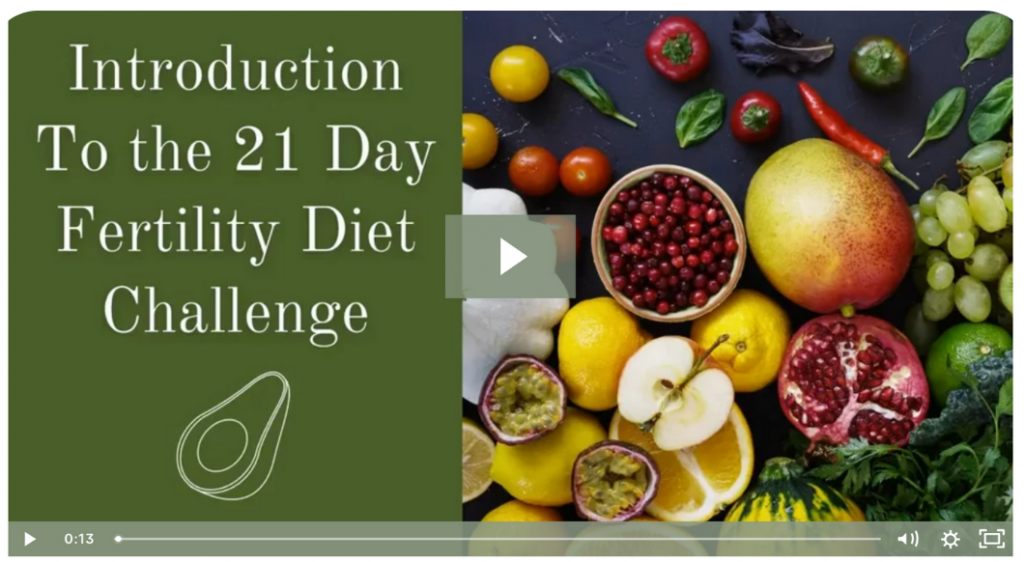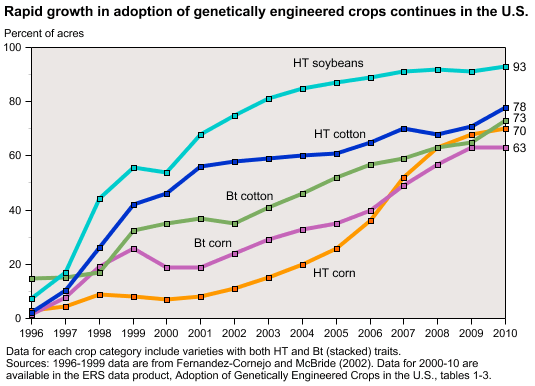Did you know that what you DON’T put into your body is as important for your fertility as what you do put into your body?
Just as there are nutrients that benefit and support healthy fertility, there are also anti-nutrients that can negatively impact your fertility.
Anti-nutrient: A compound or effect from something that either takes more nutrients from the body to process or takes more nutrients from the body to fight the effects from it. Basically, a compound that is causing more harm than good.
Here is a list of 5 anti-nutrients you should avoid at all costs (in no particular order, they are all very important to avoid):
1. GMO
GMO is another anti-nutrient that I think it is very important for you to be aware of. GMO is not a food or nutrient, but instead it is something that is done to our foods.
Genetically modified organism (GMO)
“A genetically modified organism (GMO) or genetically engineered organism (GEO) is an organism whose genetic material has been altered using genetic engineering techniques. These techniques, generally known as recombinant DNA technology, use DNA molecules from different sources, which are combined into one molecule to create a new set of genes. This DNA is then transferred into an organism, giving it modified or novel genes.”
GMO foods are foods that have been altered by science to grow bigger, have herbicide tolerance, and be insect resistant, amongst other things. They have been altered from their natural, nutritious state into a food that studies now show can negatively impact your fertility amongst causing other health issues.
One of the few long-terms studies (there are not many long-term studies done on GMO foods) showed that mice fed GMO corn over a period of 20 weeks had greatly impaired fertility compared to the mice fed non-GMO corn. In addition, the offspring of the GMO mice also suffered from lower fertility rates.
According to the USDA:
Another food that is generally GMO is soy. In the U.S., approximately 54% of all soybeans cultivated in 2000 were genetically-modified, in 2010, 93% of soybeans are genetically modified.
While soy, corn, and potatoes are the most prevalent GMO foods, there are many others that you should be aware of as well, such as:
- Salmon
- Canola oil
- High fructose corn syrup/corn sugar (one of the reasons there is so much GMO corn being grown. The other reason for so much corn is that it is readily fed to livestock)
- Dairy (conventional cows are injected with the genetically engineered hormone rBGH/rBST and are frequently fed GMO corn and grains.)
- Processed foods (many processed foods have been tested and shown to contain some GMO ingredients.)
How to avoid GMO foods
In the US there are currently no labeling laws requiring that the inclusion of GMO foods be placed on the label. The best ways to avoid GMO foods are to buy organic and shop at the farmer’s market.
- Buy organic – If it is organic it is not a GMO food. In the US and Canada, manufacturers are not allowed to label something as 100% organic if it has been genetically modified or if it is an animal and has been fed genetically modified feed. So when it comes to eggs, dairy, and meats, organic is a must.
- Know your numbers – on produce, there is a little sticker that has a number on it. This can tell you if the produce is GMO, organic or conventional. Keep in mind that food producers are not required to tell us if the produce they are selling is GMO, so buying organic is still the best option.- If it is a 4-digit number, the food is conventionally produced.
– If it is a 5-digit number beginning with an 8, it is GMO. However, do not trust that GE foods will have a PLU identifying it as such, because PLU labeling is optional.
– If it is a 5-digit number beginning with a 9, it is organic. - Avoid processed foods – Processed foods can contain GMO ingredients and do not have to disclose it on the label. They can also contain other harmful ingredients such as MSG and other chemicals without disclosing them on the label. In addition, processed foods are not healthy and should be avoided anyway.
Watch The Introduction to the 21 Day Fertility Diet Challenge
- Learn how to transition to a natural fertility diet by focusing on the important 5
- Get all the details on how to use nutrition as a tool for hormonal health, cell protection and fertility wellness
- An effective tool to help your tastebuds transition towards healthier foods
- Learn which foods are most important for fertility and how to regularly eat them

2. Pesticides, herbicides, hormones
The pesticides and herbicides sprayed on our foods and lawns have been shown to negatively impact fertility. Studies have shown that these chemicals affect both male fertility (lower sperm count) as well as female fertility (causing hormonal imbalances).
In men pesticides have been shown to effect:
- The male reproductive tract
- Sperm health
- Sperm motility
- Sperm count
- Overall male fertility
- Hormonal balance
In women pesticides affect fertility in many different ways by disrupting:
- Hormone synthesis
- Hormone release and storage
- Hormone transport
- Hormone receptors
- Thyroid function
- The central nervous system
While pesticides and herbicides are not the only chemicals that should be avoided, they are some of the most prevalent. The best way to avoid ingesting these anti-nutrients is to buy organic foods including organic fruits, vegetables, dairy, meats, etc. Conventional animals are fed grains and feed that contain a lot of pesticides. Chemicals such as pesticides are stored in the fat of the animal’s body, and when they are eaten or their milk is consumed, the consumer is getting a concentration of these chemicals.
If you are switching from a conventional diet to an organic one and are concerned about the chemicals and toxins left over from your original lifestyle, you may want to look into doing a Fertility Cleanse to help support the liver in cleaning out these compounds. In addition, if you are overweight, losing weight and sweating are the best ways to get rid of the chemicals that are stored in the fat.
3. Sugar
Sugar may be the one thing that most people know is not good for them. But how does it affect fertility specifically? First, I want to clarify what type of sugar I am speaking of. Processed sugars such as high fructose corn syrup, white sugar, corn sugar, etc., are the bad ones, while the sugars found in fruits are healthy, natural sugars. What about honey and maple syrup you ask? In small amounts they are fine, but it is the processed sugars that I am addressing here.
When someone consumes sugar, it creates a spike in the blood sugar causing the body to release insulin, trying to balance the blood sugar levels. Over time, when sugar is consumed day in and day out, this can create an insulin resistance, where the body is not responding to the insulin being released. This can go on to cause many different health issues, one of the main fertility ones being PCOS. PCOS affects ovulation and implantation of the ovum, as well as increasing the rate of miscarriage.
So avoiding processed sugars is one of the best things that you can do to eat a healthier, fertility-friendly diet. Be clear that I am not recommending to eat sugar-free foods or diet sodas either, as they are also known to cause many health issues as well and should be avoided with as much vigor. What I am recommending to eat instead is a healthy, whole food, plant-based diet (you can include meat or not, it is up to you) as nature intended and avoid processed sugar.
Some alternatives to processed sugars are:
Stevia– stevia is an amazing herb that is sweet but contains no sugar whatsoever. It is very potent so start with a small amount, let the flavor grow on you. My favorite form is the powdered herb, which should be green, not white.
Honey – in small amounts honey is a good sweetener
Dates – I love to put dates in my almond milk recipe because they are a natural sweetener but also contain essential minerals.
Maple syrup – Another natural sweetener that can be used in small amounts.
I know at first it seems like quitting sugar is a big deal, and it is because most of us are addicted to it, but if you cut out all sugar, after about 1-2 weeks, your cravings will go away and you will feel so much better. Just say no to sugar.
4. Plastic water bottles
The last on today’s list of anti-nutrients is plastic water bottles. Do not drink or buy water in plastic bottles. The thin plastic bottle that the water is in leaches chemicals called xenohormones into the water. These xenohormones mimic estrogen in the body, causing too much estrogen and not enough of the other important hormones (in men typically not enough testosterone to oppose the estrogen and in women not enough progesterone to oppose the estrogen.). This in turn causes hormonal imbalance and fertility issues. While there are many toxins and pollutants that are xenohormones, bottled water seems to be one that everyone is exposing themselves to, purposefully, on a daily basis.
Some alternative to drinking bottled water:
- Get a stainless steel or glass water bottle, or mason jars and fill them up at home.
- Be prepared, always have water with you.
- Buy water that is bottled in glass. “Mountain Springs” sells their water in glass bottles (the bottles are green); that is what we buy if we forget to bring our water with us.
I know we will now be receiving a flood of emails asking which type of water is the best to drink, so I am going to list my suggestions here:
- Spring water. If you can find a natural spring where you live, that is the best water you can drink.
- The second best would be Kangan water or reverse osmosis
- Third would be a table top filter such as Britta.
So these are the top 5 anti-nutrients for today (though there are many others which we will discuss in the near future). I hope you found this article to be mind-opening. Do not feel overwhelmed. Realize that all of the suggestions here are basically helping you turn towards a more natural, fertile life without so much packaging, processing, and bottling, and with way less chemicals. Here are some actions and steps that you can take today that can make all the difference:
- Buy organic as much as possible, this includes produce, dairy, meat, and grains.
- Avoid processed sugars
- Stop drinking plastic bottled water
That’s it. Are you going to do it? Share below your answer to that question.
Too learn more about related subjects covered in this article, please visit the following links:
Xenohormones: Causing a Hormone Imbalance Epidemic
- New Study Links Genetically Engineered Corn to Infertility. (n.d.). Retrieved from: https://www.organicconsumers.org/scientific/new-study-links-genetically-engineered-corn-infertility
- Adoption of Genetically Engineered Crops in the U.S. (n.d.). Retrieved from: https://www.ers.usda.gov/data-products/adoption-of-genetically-engineered-crops-in-the-us/
- Genetically-engineered food: Potential threat to fertility. (n.d.). Retrieved from: https://www.greenpeace.org/archive-international/en/press/releases/2008/ge-threat-to-fertility-11112008/
- Bretveld, R., Brouwers, M., Ebisch, I., & Roeleveld, N. (2007). Influence of pesticides on male fertility. Scandinavian Journal of Work, Environment & Health, 33(1), 13-28. doi:10.5271/sjweh.1060 Retrieved from: http://www.sjweh.fi/show_abstract.php?abstract_id=1060
- Phillips, K. P., & Tanphaichitr, N. (2008). Human Exposure to Endocrine Disrupters and Semen Quality. Journal of Toxicology and Environmental Health, Part B, 11(3-4), 188-220. doi:10.1080/10937400701873472 Retrieved from: https://www.tandfonline.com/doi/abs/10.1080/10937400701873472
- Bretveld, R. W., Thomas, C. M., Scheepers, P. T., Zielhuis, G. A., & Roeleveld, N. (2006). Reproductive Biology and Endocrinology, 4(1), 30. doi:10.1186/1477-7827-4-30. Retrieved from: https://www.ncbi.nlm.nih.gov/pmc/articles/PMC1524969/






